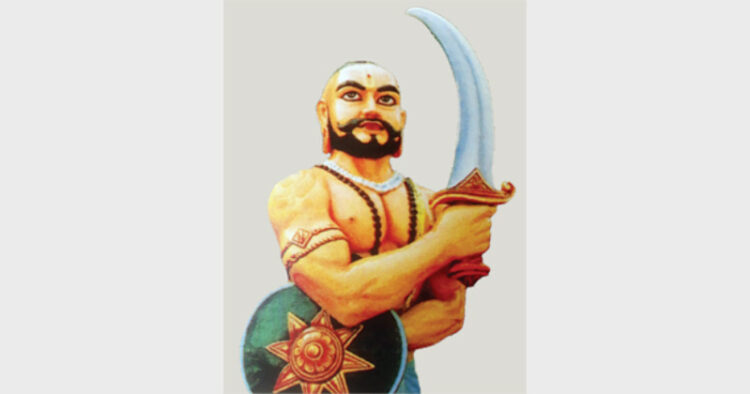When the First War of Indian Independence spread in the entire country in 1857, Chakhi Khuntia/ Chandan Hajuri was among the courageous commanders, who had dedicated his life to the sake of the common man. He had a multifaceted personality; was a brilliant revolutionary, poet, and social reformer. He was a versatile individual with a strong interest in books.
Chakhi Khuntia was born on the eve of the sacred Shamba Dasami in Puri in the year 1827. His father, Raghunath Khuntia, was a devotee of Bhagwan Jagannath. He named his son Chandan Hajuri, after the sandal paste (Chandan) with which he used to dress the Bhagwan at the moment of his birth. In a Chatasali, Khuntia was taught the Oriya language and literature. To connect with Bhagwan Jagannath’s pilgrims, he learned Hindi. Chakhi Khuntia underwent intense physical training in Puri’s traditional Akhada and learned wrestling and indigenous military feats and talents, all of which aided him in developing a powerful physique.
He married Sundarmani, a lovely young lady, when he was only 12-years-old. He frequently joined his father on his travels around Northern India. Indeed, he was introduced to and initiated into their age-old vocation of accompanying people to Puri and other places of pilgrimages in Odisha. Christian missionaries, backed by the British rulers, began spreading anti-Hindu propaganda in the early 1800s. Rev. Claudius Buchanan depicted Bhagwan Jagannath as a “Juggernaut”, who crushes naïve devotees and causes a bloodbath in his work papers. He went on to say that Jagannath is the Hindu equivalent of Moloch, who makes child sacrifices. Meanwhile, Christian missionaries began a crackdown on temple dancers, also known as nartakis, who were denigrating Odissi, Bharat Natyam, and other traditional dance forms. The temple dancers were labelled “prostitutes” and condemned. Chakhi Khuntia has been actively campaigning against Christian Missionaries and their destructive propaganda since he was a child.
Raising Voice Against Criticism of Hindu Gods and Idol Worship
Chakhi Khuntia was the family priest or Panda of Meropantha, the father of Manubai, who was renamed Laxmibai after her marriage to Jhansi’s King Gangadhar Rao. Chakhi kept in touch with Laxmibai after her marriage and used to pay the royal family visits during religious pilgrimages. During this time, the British attempted to establish their empire in India by all means necessary. With their help, the missionaries preached Christianity in a variety of ways. Even they were harshly critical of Hindu Gods and condemned idolatry and other religious practices. Chakhi Khuntia, along with others, was outspoken in their opposition to such denigration.
Gangadhar Rao, the King of Jhansi, had died by that time, and Laxmibai had lost her only son. The British forbade the queen from adopting a son to succeed to the throne of Jhansi. As a result, they stripped Rani Laxmibai of her powers. But she rose up against British control and sought the help of Chakhi Khuntia, who provided her with all the assistance she needed. On his advice, Rani Laxmibai raised her army and devised battle tactics.
With their (British) help, the missionaries preached Christianity in a variety of ways. Even they were harshly critical of Hindu Gods and condemned idolatry and other religious practices. Chakhi Khuntia, along with others, was outspoken in their opposition to such denigration
Khuntia inflamed discontent among the Indian soldiers known as “sepoys” and orchestrated a revolt that devolved into violence. ‘Panda of Sepoys’ was his moniker at the time. Chakhi Khuntia travelled to Bithur and advised Nanasaheb to assist Laxmibai in fighting the British. He counselled the queen to strive to defend her country’s dignity, and he spurred the strong lady to fight a bloody war against the enemy.
With an iron hand, the British quashed this Indian national movement against foreign authority, executing many Indian patriots in the process. Many people were executed without a trial, while others were imprisoned. In many parts of Northern India, there was an atmosphere of horror and killing. During the 1857 movement, he was stationed at Gaya and was in direct contact with the higher leadership of the movement. However, it was unknown to the British whether he was killed or not, and his entire property was entrusted to the British Government. British officials learned of his movements and secret stay in Gaya, Bihar when he addressed a letter to his brother.
Khuntia was arrested and imprisoned several times as a result of his defiance. Chakhi Khuntia was released from prison on the Commissioner’s decision, but he was not allowed to return to his hometown. On the other hand, he disregarded British Government orders and arrived in Puri.
On November 10, 1858, the Magistrate of Puri reported to the Commissioner, “Chakhi Khuntia has returned to the district and is presently in safe custody.” Queen Victoria issued an amnesty to the rebels at the time, and Chakhi Khuntia was soon released. Chakhi Khuntia lived out his final years at Puri. He devoted himself to Bhagwan Jagannath’s literary activities as well as religious ceremonies. He wrote a large number of poems, the majority of which are religious hymns. Some of his songs show his strong discontent and intense fury at the British Government’s inhumane and oppressive methods. One of his palm-leaf manuscripts is reported to be titled “Manubai,” the original name of Laxmibai, the queen
of Jhansi. In 1870, he died in Puri, India. All Indians will remember him as an immortal poet, a national hero, a great patriot, and a known Bhagwan Jagannath devotee.




















Comments